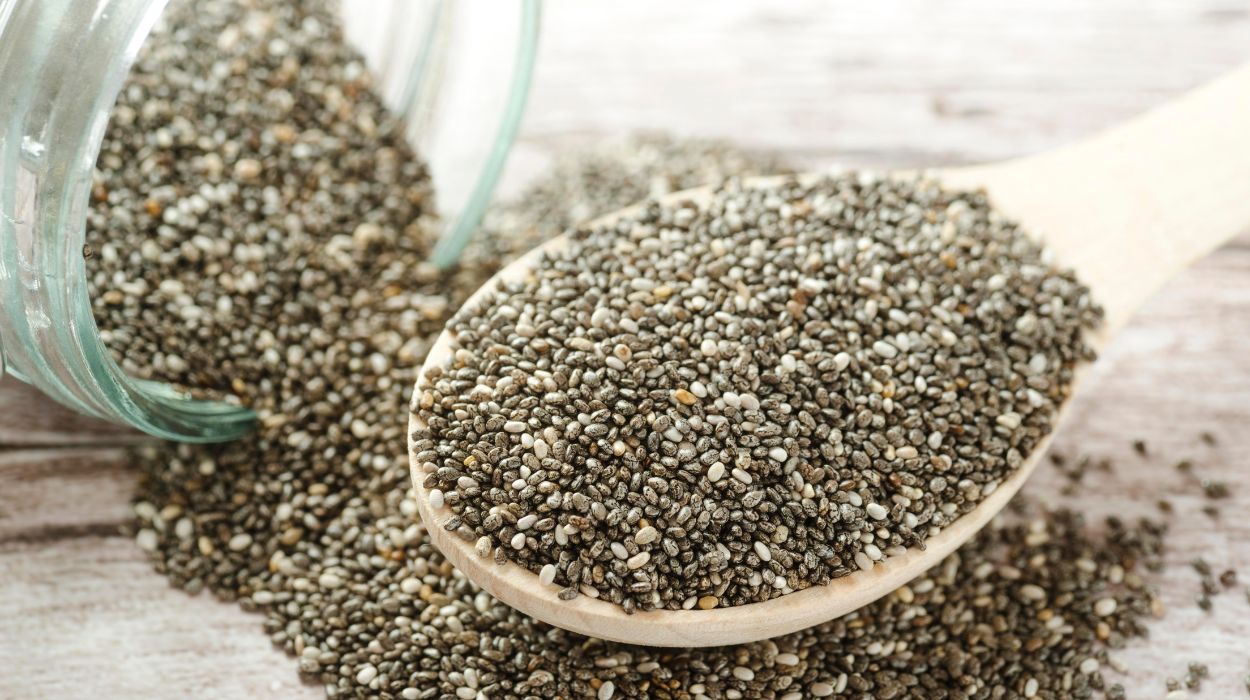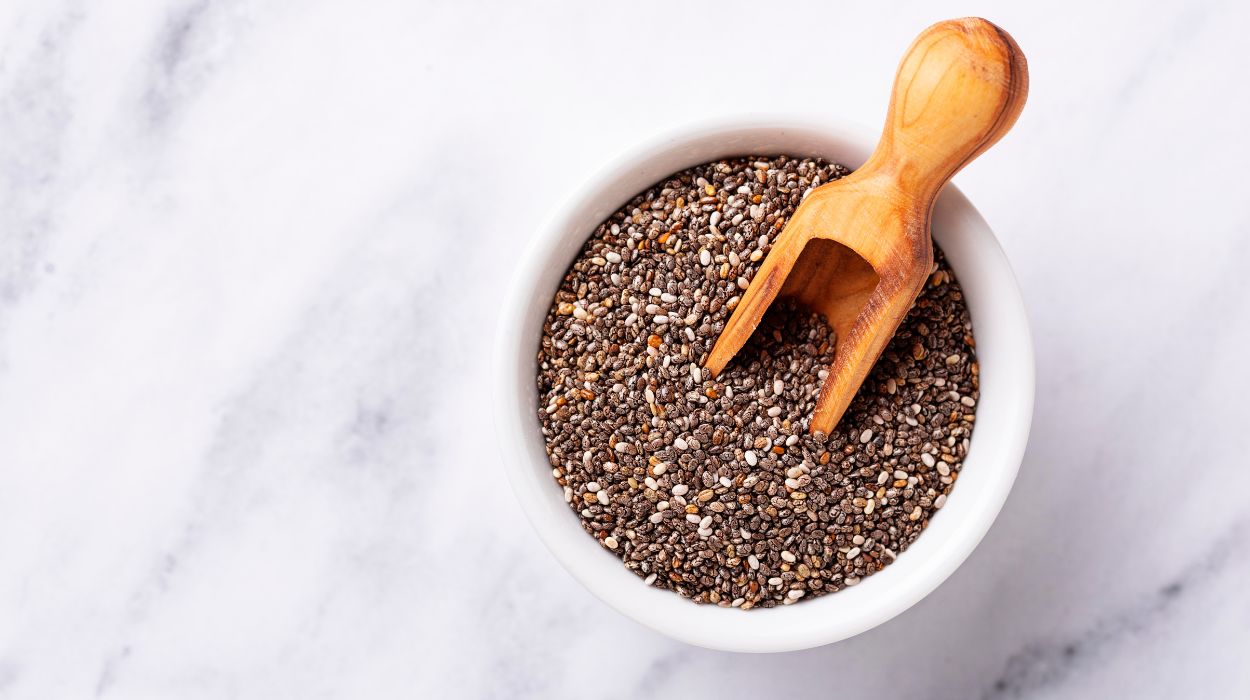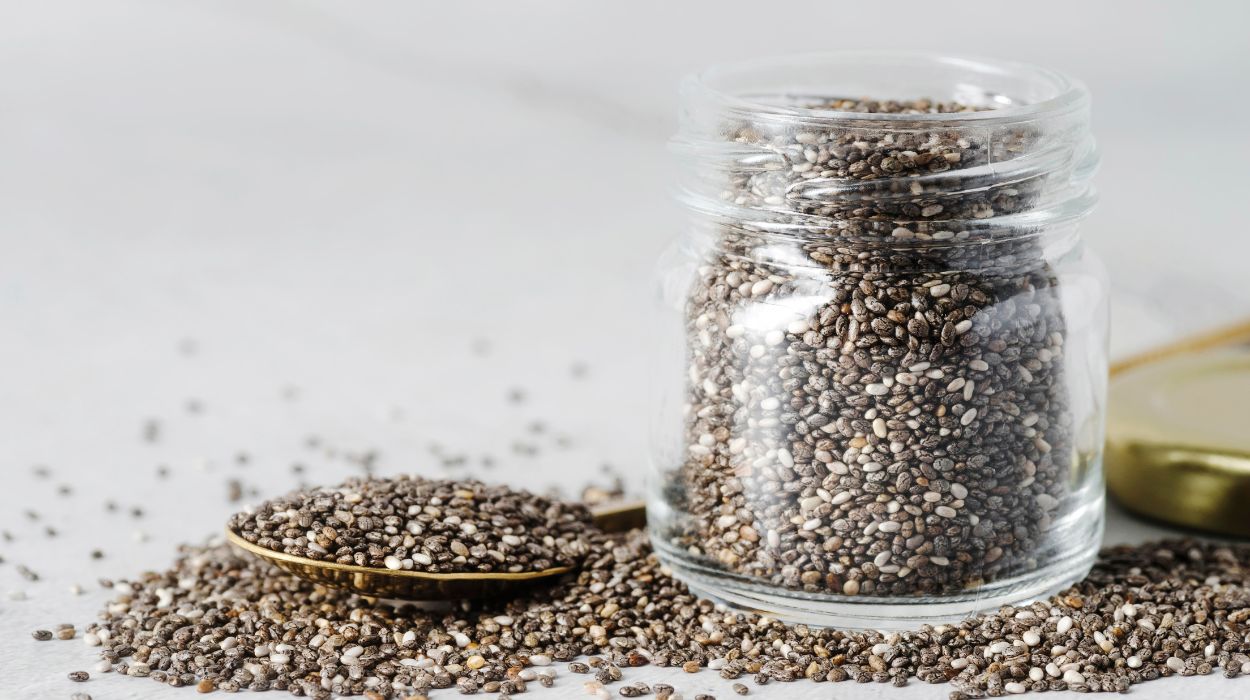 Expert's opinion
Expert's opinion
Expert's opinion
The article is a subjective view on this topic written by writers specializing in medical writing.
It may reflect on a personal journey surrounding struggles with an illness or medical condition, involve product comparisons, diet considerations, or other health-related opinions.
Although the view is entirely that of the writer, it is based on academic experiences and scientific research they have conducted; it is fact-checked by a team of degreed medical experts, and validated by sources attached to the article.
The numbers in parenthesis (1,2,3) will take you to clickable links to related scientific papers.
Do Chia Seeds Go Bad Easily? Tips To Store Chia Seeds Longer & Better In 2024

Chia seeds have become popular for their versatility and the numerous health benefits it guarantees. They are recommended as healthy seeds for weight loss and are effective for individuals managing one health condition or another.
Moreover, many market these seeds as effective for improving digestive health. Little wonder why the best protein powder for a sensitive stomach has them as its constant ingredient. These seeds are highly effective.
So you are probably thinking of stocking your pantry with the tiny seeds. However, before you do this, you want to know: Do chia seeds go bad? Find the answer to this question and many others in this article.
Let’s get right into it.
Do Chia Seeds Go Bad?
Yes, they may. However, fresh chia seeds may remain viable for up to five years upon proper preservation under palatable conditions. With refrigeration, you may even prolong the life span.
When Do Your Chia Seeds Expire?

Chia seeds expire if stored past their expiration date or under unfavorable conditions[1]. For example, exposing them to moisture will speed up their expiration date.
However, even under proper, suitable storage conditions, they will still expire after a while. Below are typical markers that indicate that they are expired.
Lumped Together
Bad chia seeds tend to appear lumped together, sticky, or moldy.
When you open the jar containing the tiny seeds, and after attempting to shake it, you find some sticking to each other, or some remain stuck at the bottom. It signifies that the seeds have become rancid and are expired.
Bug-Infested
Like regular cereals, chia seeds may get infested by storage bugs. When you open your jar containing the seeds, you see these creeping insects crawling over your seeds.
However, these bugs cannot infect the seeds; therefore, they pose no significant threat to your health. You may salvage the chia seeds by freezing them for about a day or two and then cleaning them after thawing.
Still, we recommend you do away with such seeds and get fresh ones. Using chia seeds in optimum conditions is best to maximize their health benefits.
Foul Smell
Chia seeds are potent antioxidants, though, after a couple of years, they may yield to oxidation and go rancid. Immediately you notice this; it is best to discard those seeds.
They are unhealthy for consumption and lack the nutrients and necessary antioxidants that fresh ones guarantee.
Feeling Slimy
Good chia seeds ought to appear dry. However, when you find out the seeds are becoming slimy and sticky to your fingers, this is a clear sign of expiration.
Such seeds are unsafe for use; get new ones.
Presence Of Mold
If you find mold in your container when you open it, it’s a no-brainer that you shouldn’t eat such seeds.
Perhaps you don’t know molds are fungi and may pose severe hazards to health if consumed.
If you notice any of these markers discussed above, we do not recommend you eat such seeds. However, the taste may be another noticeable marker if you fail to notice any of them.
You quickly notice the nutty, mild, almost bland flavor when you eat. However, if it tastes bitter or sour, it indicates it’s contaminated or unhealthy.
Chia Seeds Shelf Life
Every food item, including cereals and pseudocereals like chia seed, goes bad over time. That said, these tiny seeds have a long shelf life[2] of four to five years upon storage under optimum conditions.
One critical measure to ensure chia seeds remain viable for this period is to store them in an airtight container free of moisture.
However, you should note that they have a longer shelf life compared to chia powder, chia puddings, or other chia preparations.
Also, chia powder – chia flour – may have a shelf life of less than a year. A typical powdered chia seed product may have its expiration date set at six months, while the chia pudding may be for just about three to five days upon refrigeration.
Tips For Storing Chia Seeds

Since chia seeds resemble cereals, like cereals, they should be stored in a cool, dark, and dry place, free of moisture. If the original packaging is loose, you may need to transfer them to a more suitable container to allow you to enjoy them for extended periods.
Below are six critical tips for maintaining the quality of these tiny seeds throughout their shelf life.
Store In An Airtight Glass Container
Transfer your chia seeds from the original packaging – usually a bag – to an airtight container. Use glass containers (transparent ones), so you can see through and quickly notice any changes in your seeds.
Moreover, glass packaging tends to provide a stable environment, preventing spoilage. However, plastic sealable or zip-lock bags too will suffice.
Just use a container that will prevent moisture or air from penetrating. This will help ensure that your seeds remain fresh for a long time, keeping them from rancidification.
Ensure The Storage Location Is Cool And Dry
Chia seeds are best stored in a dry place at room temperature. Variations in environmental temperature and humidity may alter the integrity of the seeds.
Indeed, you can store them in the refrigerator. However, a dry store is ideal, allowing you to maximize the durability of these seeds.
Avoid Spooning Or Scooping
One way to easily contaminate your chia seeds is to use a spoon to scoop them out of the container. That said, we recommend you pour out the potion of seeds you need for your recipe.
Do not dip any utensils into the container, as you’d probably contaminate the bulk of the seeds. However, if you want to use a spoon, ensure it’s clean, dry, and dust-free.
Inspection
Remember, the seeds can remain viable for up to five years. So, you may need to check them occasionally, even if you do not plan on using them for a long time.
You can pour out a small portion to check for some of the spoilage markers we mentioned earlier. If you notice it’s losing its quality, you should quickly refrigerate it to prolong its lifespan.
Refrigeration
Although this isn’t necessary, it is effective for prolonging the shelf life of chia seeds, especially if you suspect contamination. This may be more important if you rarely use the seeds.
Freezing helps to kill off potential microbes that are present in the seeds. After thawing and cleaning, you can restore the seeds in an airtight glass jar.
Avoid Grinding Until Ready For Use
As we mentioned earlier, grinding accelerates their shelf life. The larger surface area of powdered chia seeds makes them more readily available for insect and microbial infestation. However, research[3] suggests that grinding chia seeds increases the body’s ability to absorb nutrients. Therefore, grinding before eating may be more beneficial for your health.
Is It Dangerous To Eat Expired Chia Seeds?
Yes, it may be dangerous to eat expired chia seeds, especially if they are already showing signs of spoilage. However, if they still seem normal, past the manufacturer’s expiration date, they may be safe to eat.
Note we do not recommend consuming bad chia seeds or any expired food items. But still, if they are not clumped and show no sign of spoilage or rancidity, mold, or bug infestation, it may be safe. However, we must inform you that eating expired ones may expose you to more intense side effects.
Can You Freeze Chia Seeds?
Yes, you can freeze them. If you have closely followed us, we have recommended freezing them as an effective method[4] of elongating their shelf life.
When you want to freeze the seeds, use an airtight packaging, preferably a freezer bag. You might still put them in a gas container to prevent the seeds from picking up the smell of other items in the refrigerator.
Also, note that if these seeds interact with water, even frozen chia seeds, they may begin to swell. Hence, our emphasis of storing in airtight packaging.
When ready to use the seeds, you can leave them in the open air overnight to thaw. However, if you add them to smoothies, you may use them in the frozen form.
Conclusion
Chia seeds are highly nutritious and benefit all. Their benefits for weight loss are now common in the wellness community because of their unique attributes in weight management.
It’s a natural remedy for enhancing your overall health, yet you can consume it as a beverage, soak it, or incorporate it in smoothies.
+ 4 sources
Health Canal avoids using tertiary references. We have strict sourcing guidelines and rely on peer-reviewed studies, academic researches from medical associations and institutions. To ensure the accuracy of articles in Health Canal, you can read more about the editorial process here
- Kely, C., Cardoso, F.C., Henrique, C., Carina, A. and Charline Zaratin Alves (2018). Chia Seeds Storage in Different Environmental Conditions and Packages. [online] doi:https://doi.org/10.4236/ajps.2018.91007.
- J.P. Cruz-Tirado, Marciano, Milton, Helena Teixeira Godoy, Rantanen, J. and Douglas Fernandes Barbin (2021). Shelf life estimation and kinetic degradation modeling of chia seeds (Salvia hispanica) using principal component analysis based on NIR-hyperspectral imaging. [online] 123, pp.107777–107777. doi:https://doi.org/10.1016/j.foodcont.2020.107777.
- Ang, M.E., James William Cowley, Yap, K., Sei Kwang Hahn, Mikkelsen, D., Tucker, M.G., Williams, B.A. and Burton, R.A. (2023). Novel constituents of Salvia hispanica L. (chia) nutlet mucilage and the improved in vitro fermentation of nutlets when ground. [online] doi:https://doi.org/10.1039/d2fo03002k.
- Giannakourou, M.C. and Petros Taoukis (2021). Changes during Food Freezing and Frozen Storage. [online] 10(11), pp.2525–2525. doi:https://doi.org/10.3390/foods10112525.



